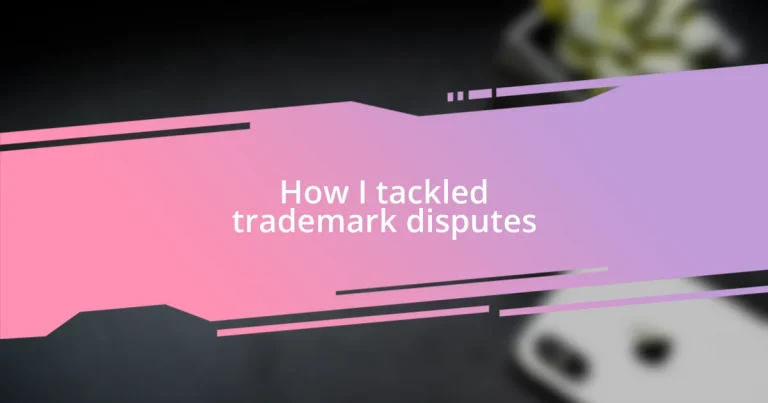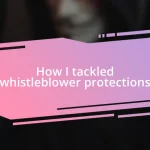Key takeaways:
- Trademark disputes are deeply intertwined with brand identity and reputation, necessitating careful navigation and understanding of trademark law.
- Thorough trademark research is essential for preventing legal conflicts, positioning in the market, and fostering creativity in branding.
- Effective negotiation techniques, including active listening and creating win-win scenarios, can lead to collaborative resolutions in trademark disputes.
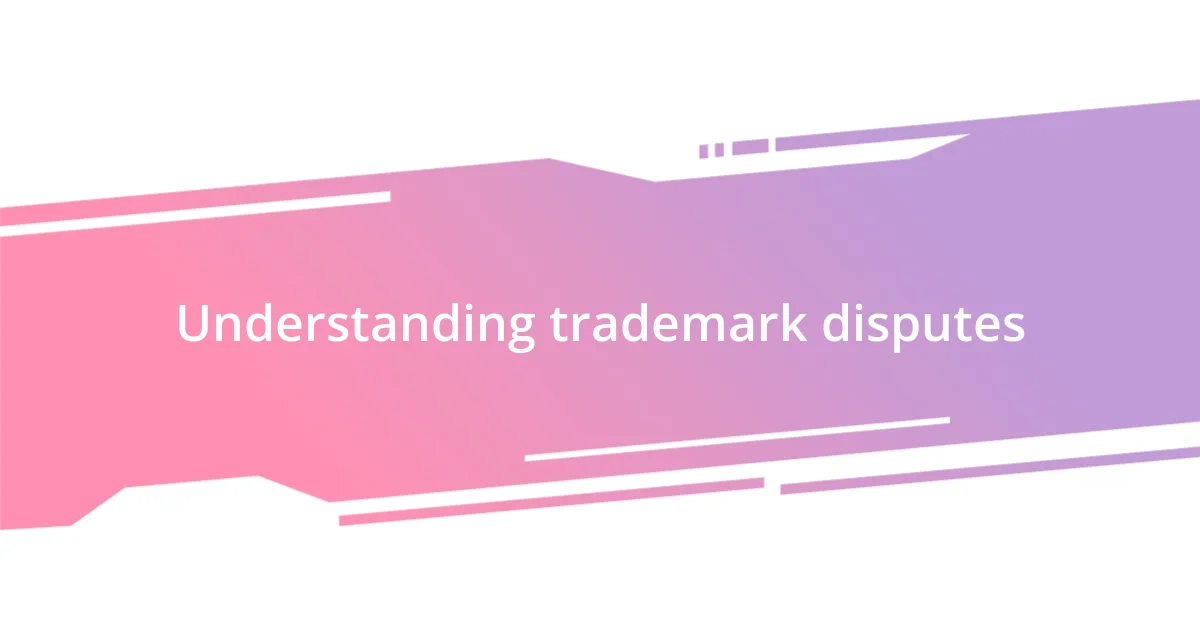
Understanding trademark disputes
Trademark disputes often arise when two entities claim rights over similar marks, leading to confusion for consumers. I remember grappling with a case early in my career, feeling the tension rise as we tried to navigate the fine line between protecting our brand and respecting others. It’s a delicate balancing act, isn’t it?
Understanding the core of these disputes goes beyond just the legal jargon; it’s about the reputation and goodwill attached to a brand. I once had a colleague who emphasized that every trademark dispute is, at its heart, a story of identity—how a name or logo becomes intertwined with a business’s essence. Have you ever thought about how much your favorite brands mean to you?
These conflicts often involve a complex analysis of likelihood of confusion, market presence, and the distinctiveness of the marks. I vividly recall working late nights with my team, poring over case studies and past rulings, searching for the insight that would tip the scale in our favor. It’s no wonder that understanding trademark law feels like solving a puzzle where every piece is crucial!
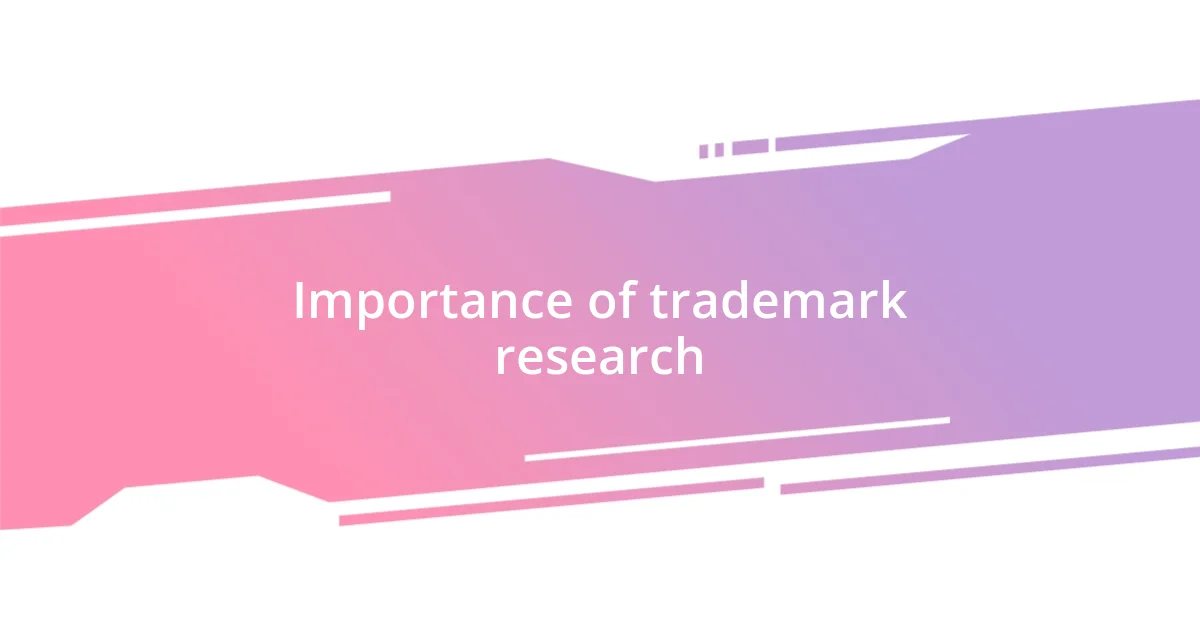
Importance of trademark research
Trademark research is not just a formality; it’s an essential step that lays the foundation for protecting your brand. I remember when I first launched my own product line. I neglected thorough research and nearly found myself in a trademark dispute, causing endless stress. This experience highlighted the critical importance of understanding existing trademarks before jumping into branding.
When you conduct trademark research, you not only prevent potential legal battles but also position yourself strategically in the market. One analyzing session I had with a mentor revealed how avoiding conflict could bolster a brand’s credibility. It felt empowering to see firsthand how knowledge could lead to informed decisions, strengthening our brand image and consumer trust. Have you considered how much effort could be saved simply by investing time in research?
Finally, trademark research enhances creativity in branding. Instead of simply avoiding conflicts, it opens up a wider lens for creating unique names or logos that resonate with your audience. I once brainstormed ideas with my team for hours, feeling exhilarated at the prospect of crafting something new, only to discover a competing mark. That moment underscored for me the joy that research brings—not just a clear path but inspiration to innovate within the bounds of the law.
| Research Aspect | Benefits |
|---|---|
| Legal Protection | Prevents disputes and legal challenges |
| Market Positioning | Helps establish a unique brand identity |
| Creative Freedom | Encourages innovative branding ideas |
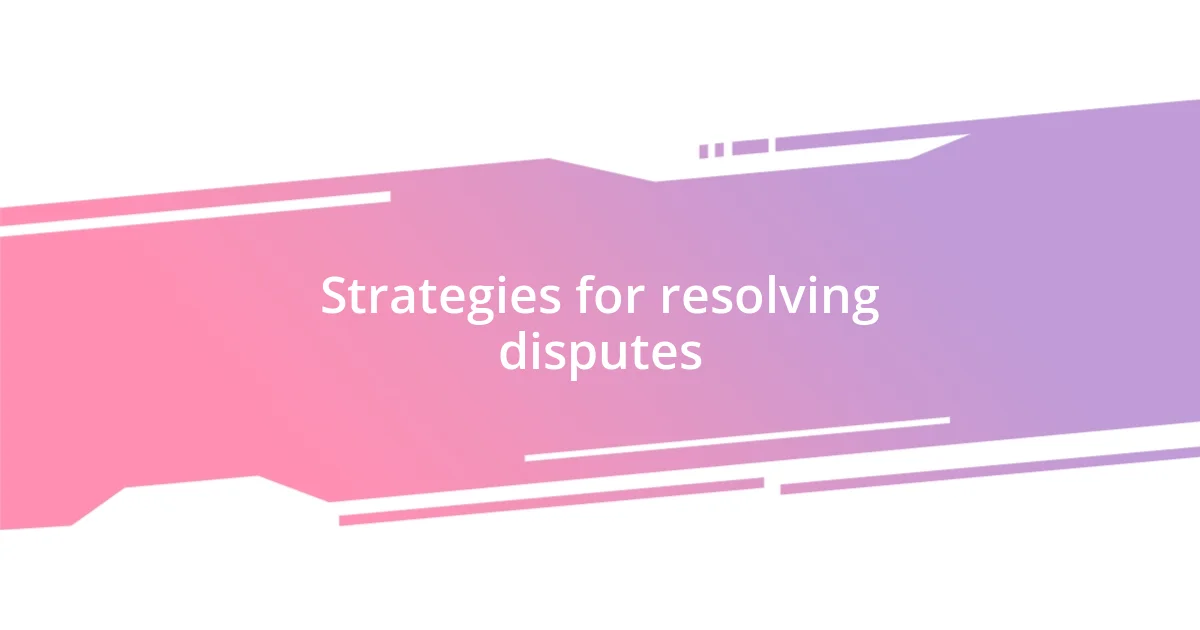
Strategies for resolving disputes
Disputes don’t have to escalate; I’ve found that open communication can be a game changer. During one particular case, I reached out to the opposing party to discuss our concerns directly, and it felt like lifting a weight off my shoulders. This candid conversation led us to discover common ground and ultimately negotiate a settlement that favored both sides. Sometimes, it’s just about having that first conversation.
Here are some practical strategies that can pave the way for resolving trademark disputes:
- Mediation: A neutral third party can facilitate discussions, helping both sides reach a mutually agreeable solution.
- Cease and Desist Letters: Sometimes, a formal letter can lay the groundwork for serious negotiations, clarifying positions without escalating tensions.
- Collaboration and Licensing: Exploring opportunities for coexistence can open doors. I once partnered with a brand to co-create a product, turning potential conflict into a collaboration!
- Alternative Dispute Resolution (ADR): Avoiding court can save time and money, allowing for more creative solutions.
- Trademark Clearinghouse: Utilizing this service can aid in identifying potential conflicts early on, enabling proactive measures before issues arise.
In my experience, approaching disputes with a mindset of collaboration, rather than a combative stance, has yielded the best outcomes. You’ll find that sometimes, what seems like the end of the road can actually be a new beginning when both parties are willing to work together.
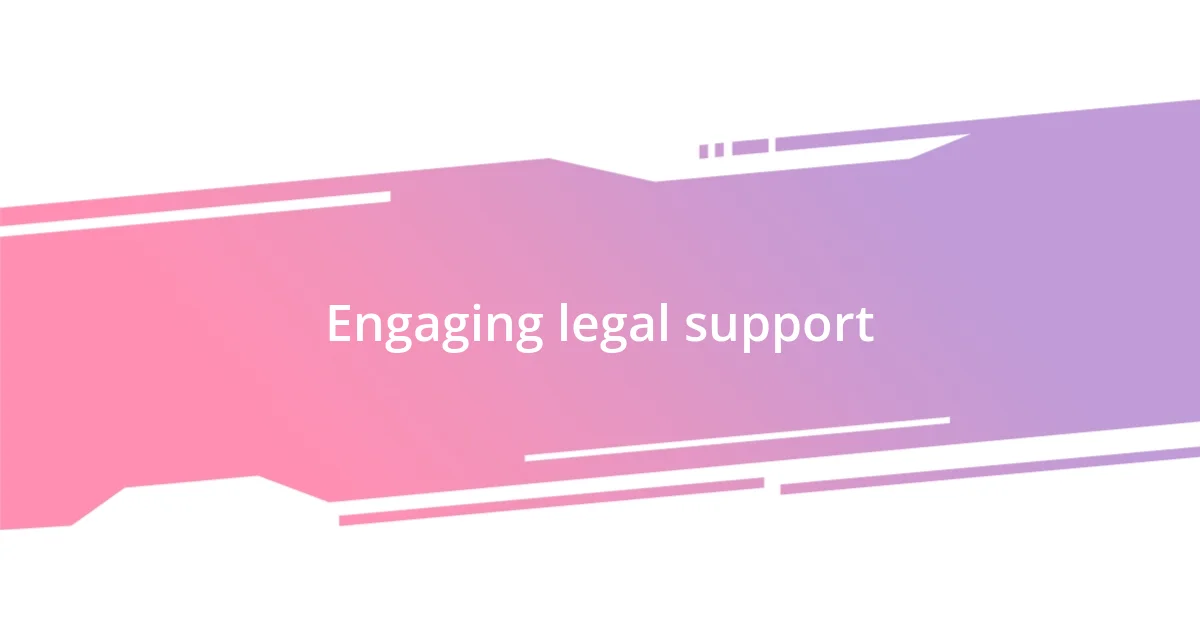
Engaging legal support
Engaging legal support is about choosing the right partner who understands the nuances of trademark law. I still remember my first meeting with an intellectual property attorney. Their enthusiasm for trademark protection was infectious and made me realize how crucial it is to have someone on your side who not only knows the law but also appreciates your brand’s unique story. Doesn’t it feel reassuring to know you have an advocate who genuinely cares about your success?
Finding legal support can be daunting, especially with so many options available. In my case, I sought recommendations from fellow entrepreneurs. One referral led me to a fantastic firm that specialized in trademark law and had a track record of successful negotiations. Their personalized approach gave me the confidence to navigate potential disputes ahead—something I never would’ve achieved alone. Have you considered how much smoother your journey could be with the right legal team backing you?
Ultimately, a good attorney doesn’t just provide legal advice—they empower you to make informed decisions. I recall a conversation where my lawyer delved into different strategies for protecting my brand, explaining each option with clarity. The more I learned, the less intimidating the process felt. It became clear that engaging legal support was not just about resolving issues but about building a solid foundation for my business’s future. When was the last time you felt that sense of empowerment from a professional partnership?
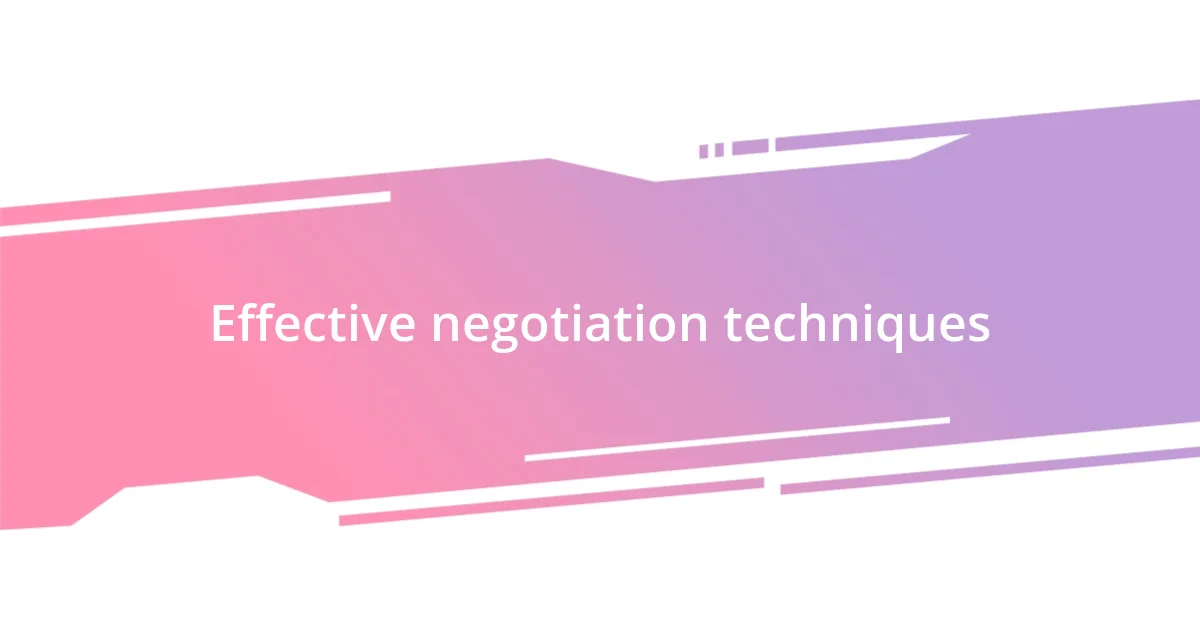
Effective negotiation techniques
Negotiating effectively can often feel like walking a tightrope, balancing assertiveness with diplomacy. I remember one arduous negotiation where I planned ahead, preparing not only my stance but also anticipating the opposing party’s concerns and motivations. That level of preparation allowed me to steer discussions toward solutions, creating an environment where collaboration felt achievable instead of confrontational.
One technique I’ve found particularly useful is the art of active listening. During a particularly heated negotiation, I focused on truly hearing the other party’s perspective instead of just waiting for my turn to speak. It’s fascinating how empathy can dissolve tension; once they felt heard, they became more receptive to my points of view. Have you ever noticed how simply acknowledging someone else’s feelings can lighten the mood?
Lastly, I always strive to create win-win scenarios. In one instance, I proposed a creative licensing arrangement that not only alleviated the immediate issues but also expanded our market reach. It was incredible to see how a shift in mindset from competition to cooperation transformed the situation. Isn’t it rewarding when both sides walk away feeling valued and satisfied?
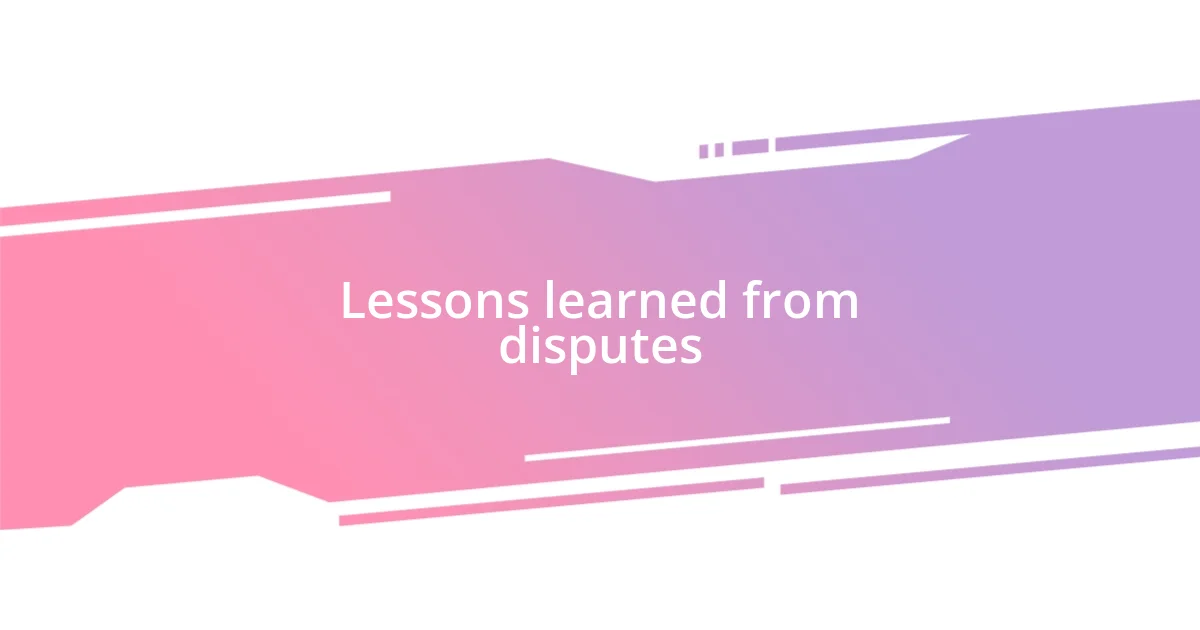
Lessons learned from disputes
I learned that preparation is key. After experiencing a trademark dispute, I understood how essential it is to research your case thoroughly and gather all relevant documentation. I recall spending hours organizing my evidence, and that diligence made all the difference when presenting my position. Have you ever faced a situation where being over-prepared changed the outcome for you?
Another vital lesson was recognizing the importance of adaptability. During one dispute, I quickly realized that my initial strategy wasn’t resonating with the other party. Instead of sticking to my guns, I decided to pivot and explore alternative solutions. This flexibility unexpectedly opened the door to a collaborative agreement that I hadn’t initially considered. Isn’t it fascinating how being open-minded can sometimes lead to unexpected, positive outcomes?
Lastly, I came to appreciate the emotional toll these disputes can take. I remember feeling stressed and overwhelmed, unsure if I’d ever find resolution. It taught me to prioritize self-care during the process. I now share this with others facing similar challenges, encouraging them to seek support and recognize that it’s okay to feel vulnerable. How do you cope with tension during challenging business situations?
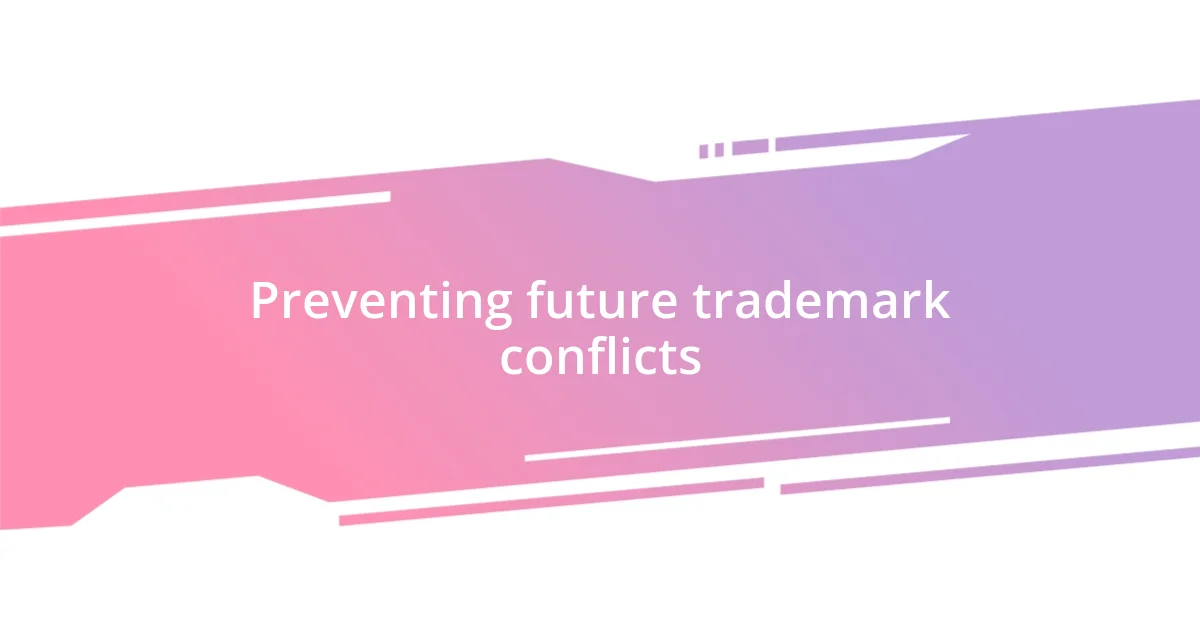
Preventing future trademark conflicts
Preventing future trademark conflicts hinges on being proactive about brand management. I once realized how vital it was to conduct regular trademark audits after a close call with a similar brand. Establishing a habit of reviewing and updating our trademarks not only bolstered our protection but also heightened our awareness of potential infringements brewing on the horizon. Have you considered how routine checks could safeguard your brand?
Another strategy I’ve adopted involves clear communication of trademark usage guidelines to all partners and affiliates. I remember a time when a partner unintentionally misrepresented our brand on social media, which could have led to confusion among our consumers. By creating a straightforward guide on how our trademark should be portrayed, we mitigated the risk of misuse. Isn’t it comforting to know that clarity can be a shield against potential conflicts?
Additionally, I invest in ongoing education about trademark law for my team. I once attended a fascinating workshop that unveiled nuances of trademark rights I hadn’t considered before. Sharing that knowledge empowered my colleagues to identify potential issues early, effectively making them advocates for our brand’s integrity. How often do you invest in learning to stay ahead of legal challenges?












